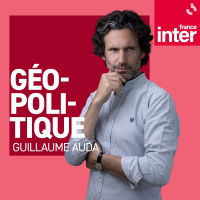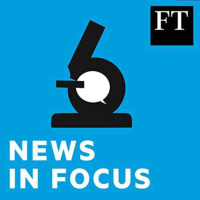Synopsis
Interviews with Economists about their New Books
Episodes
-
Yutao Sun and Seamus Grimes, “China and Global Value Chains” (Routledge, 2018)
30/04/2018 Duration: 44minToday I was joined by Seamus Grimes from Ireland where he is Emeritus Professor at the National University of Ireland, Galway. With Yutao Sun (Dalian University of Technology), he just published a very interesting and timely book China and Global Value Chains: Globalization and the Information and Communications Technology Sector (Routledge, 2018). President Trump has raised the intriguing question of bringing the manufacturing of companies like Apple back from China to the U.S. This book, however, argues that in this age of the knowledge-based economy and increased globalization, that value creation and distribution based on knowledge and innovation activities are at the core of economic development. The double-edged sword of globalization has transformed China’s economic development in the past few decades. Although China has benefitted from globalization and is now the second largest economy in the world, having become a global manufacturing power and the biggest exporter of high-tech products, it continue
-
What Money Can’t Buy with Michael Sandel
26/04/2018 Duration: 31minMichael Sandel is Anne T. and Robert M. Bass Professor of Government at Harvard University. Sandel is an internationally renowned political philosopher who Newsweek has lauded as “the world’s most relevant living philosopher.” His latest project is a video series titled What Money Can’t Buy, which has Michael and an international group of college students exploring the question “What, if anything, is wrong with a world in which everything is for sale?” You can view the series for free at whatmoneycantbuy.org. The "Why We Argue" podcast is produced by the Humanities Institute at the University of Connecticut as part of the Humility and Conviction in Public Life project. Learn more about your ad choices. Visit megaphone.fm/adchoices Support our show by becoming a premium member! https://newbooksnetwork.supportingcast.fm/economics
-
Marcella Corsi et al., “Classical Economics Today: Essays in Honor of Alessandro Roncaglia” (Anthem Press, 2018)
18/04/2018 Duration: 40minI met in Rome, at Sapienza University, with two of the three editors of a great new book in economics. Marcella Corsi is professor of economics at Sapienza University of Rome, Italy, and editor of the International Review of Sociology. Carlo D’Ippoliti is associate professor of economics at Sapienza University of Rome, Italy, and editor of PSL Quarterly Review. He is also one of the hosts of this channel. The third editor is Jan Kregel, director of research at the Levy Economics Institute of Bard College, USA, and professor of development finance at Tallinn University of Technology, Estonia. He is also co-editor of the Journal of Post-Keynesian Economics. Classical Economics Today (Anthem Press, 2018) is a collection of essays in honour of Alessandro Roncaglia. It provides an overview on his contributions and on the Classical tradition in Economics. It is a history of ideas in Economics but also an attempt to discuss their contemporary relevance to economic policy and economic theory. The contributors to the
-
David Pilling, “The Growth Delusion: Wealth, Poverty, and the Well-Being of Nations” (Bloomsbury, 2018)
04/04/2018 Duration: 46minWhat’s not to like about economic growth, you might ask? Well, quite a lot, it turns out, once we begin to examine how GDP and other measures of the economy are constructed, and once we see what they leave out (and perhaps just as troubling, what they leave in). Join us as we speak with David Pilling about his new book, The Growth Delusion: Wealth, Poverty, and the Well-Being of Nations (Tim Duggan Books/Bloomsbury, 2018), which helps us understand the problems with how we typically evaluate national economies and offers some alternative approaches even though each of those options presents their own challenges. Stephen Pimpare is Senior Lecturer in the Politics & Society Program and Faculty Fellow at the Carsey School of Public Policy at the University of New Hampshire. He is the author of The New Victorians (New Press, 2004), A People’s History of Poverty in America (New Press, 2008), winner of the Michael Harrington Award, and Ghettos, Tramps and Welfare Queens: Down and Out on the Silver
-
Fahad Bishara, “A Sea of Debt: Law and Economic Life in the Western Indian Ocean, 1780-1950” (Cambridge UP, 2017)
03/04/2018 Duration: 51minToday I talked to Fahad Bishara about his book A Sea of Debt: Law and Economic Life in the Western Indian Ocean, 1780-1950 (Cambridge University Press, 2017). Dr. Bishara is Assistant Professor of History at the University of Virginia. He specializes in the economic and legal history of the Indian Ocean and Islamic world. In this podcast, Dr. Bishara discusses his sophisticated history that explores the intricate legal and economic regimes that traversed the Western Indian Ocean for generations. He also talks about how he effectively mined legal documents to craft this narrative. The following podcast was originally published on H-Law’s Legal History Podcast.Learn more about your ad choices. Visit megaphone.fm/adchoices
-
Martijn Konings, “Capital and Time: For a New Critique of Neoliberal Reason” (Stanford UP, 2018)
28/03/2018 Duration: 41minToday I was joined by Martijn Konings from Australia where he is Associate Professor of Political Economy at the University of Sydney. We had a conversation on his most recent book Capital and Time: For a New Critique of Neoliberal Reason (Stanford University Press, 2018). Its main contribution is to offer an original point of view on the issue of speculation. Critics of capitalist finance tend to focus on its speculative character. Our financial markets, they lament, encourage irresponsible bets on the future that reflect no real underlying value. Why is it, then, that opportunities for speculative investment continue to proliferate in the wake of major economic crises? To make sense of this, Capital and Time offers an understanding of economy as a process whereby patterns of order emerge out of the interaction of speculative investments. Speculation, he argues, is an essential intrinsic feature of capitalism and not just a negative spillover or a collateral behavior. The book also provides an original view
-
George Paul Meiu, “Ethno-erotic Economies: Sexuality, Money and Belonging in Kenya” (U Chicago Press, 2017)
26/03/2018 Duration: 53minProfessor George Paul Meiu‘s debut anthropological book, Ethno-erotic Economies: Sexuality, Money, and Belonging in Kenya (University of Chicago Press, 2017), dives into the commodification of culture and sex on the beachfronts of coastal Kenya, as well as the ramifications and shifting economic power dynamics in rural Samburu villages that result from this new economy. Utilizing over a decade of community engagement and research, Meiu expertly engages in intense anthropological study without exploitation and judgment. Rather he succeeds in humanizing his subjects as he explores the creation and development of a new economy, that of engaging with white, largely Western European women, in romantic relationships in exchange for money, goods and, eventually, higher economic and social status in their home rural communities. But with this new economy comes challenges to traditional social structures, as sexuality and wealth intersect with traditional land tenure and power. Meiu, with his deep understanding
-
Stephen Cummings, et al., “A New History of Management” (Cambridge UP, 2017)
21/03/2018 Duration: 41minDid Abraham Maslow actually ever draw a pyramid of hierarchy of needs? Did Kurt Lewin devote substantial work on the development of a change management theory? Why do we omit or misrepresent important features of the work of Adam Smith, Max Weber or Frederick Winslow Taylor? What is the forgotten origin of Harvard Business School case method? I was joined by two of the authors—Stephen Cummings and Todd Bridgman— ofA New History of Management (Cambridge University Press, 2016), a great new book that answers those and many more questions. The book is a very important contribution to critical management studies that uncovers the inaccuracies and simplifications (if not actual inventions) that populate management and organization textbooks. A New History of Management is not a conspiracy theory, but rather it is the result of rigorous historical research on how the field of management studies was constructed in the past century. The authors argue that the existing narratives about how we should organi
-
Shiri Noy, “Banking on Health: The World Bank and Health Sector Reform in Latin America” (Palgrave Macmillan, 2017)
28/02/2018 Duration: 01h04minWhat role has the World Bank played in influencing health sector reform in Latin America? In her new book, Banking on Health: The World Bank and Health Sector Reform in Latin America (Palgrave Macmillan, 2017), Shiri Noy explores this question and more using mixed methods, including interviews, quantitative analysis, and review of policy documents and archives. The book starts off by providing readers a history of the World Bank and its role in health reform. Even though it may seem as if the World Bank would have a similar solution across countries, Noy finds that involvement and plans are more variable due to the systems already in place within these countries. Noy then moves on to an analysis of health expenditures, finding surprising results that further drove her research project and curiosity. The book then explores three countries in turn: Argentina, Peru, and Costa Rica. This book provides rich analysis of a complex social issue and set of systems, sending the reader away with both empirical and theor
-
Taisu Zhang, “The Laws and Economics of Confucianism: Kinship Property in Preindustrial China and England” (Cambridge UP, 2017)
27/02/2018 Duration: 58minTaisu Zhang ties together cultural history, legal history, and institutional economics in The Laws and Economics of Confucianism: Kinship and Property in Pre-Industrial China and England (Cambridge University Press, 2017) and offers a novel argument as to why Chinese and English pre-industrial economic development went down different paths. Late Imperial and Republican China (1860-1949) was dominated of Neo-Confucian social hierarchies, under which advanced age and generational seniority were the primary determinants of sociopolitical status. This allowed many poor but senior individuals to possess status and political authority highly disproportionate to their wealth. In comparison, in the more individualistic early modern England (1500-1700) landed wealth was a fairly strict prerequisite for high status and authority. This essentially excluded low-income individuals from secular positions of prestige and leadership. Zhang argues that this social difference had major consequences for property institutions an
-
Christopher Witko and William Franko, “The New Economic Populism: How States Respond to Economic Inequality” (Oxford UP, 2017)
26/02/2018 Duration: 22minIn the last few weeks, minimum wage workers in 18 states saw their wages go up; in Maine a full dollar increase. Why states have taken the lead on raising the minimum wage is the topic of the new book from Christopher Witko and William Franko, The New Economic Populism: How States Respond to Economic Inequality (Oxford University Press, 2017). Witko is associate professor of political science at the University of South Carolina; Franko is assistant professor of political science at West Virginia University. In the book, they argue, despite rising inequality, the federal government has been unable to muster the will to address the problem. Instead, we are seeing many states actively addressing economic inequality, often through direct democracy. Franko and Witko show that the states that address inequality are not necessarily those with the greatest levels of inequality, but instead are those states where citizens are aware and concerned with growing inequality. They examine how various factors have shaped sta
-
Rachel Sherman, “Uneasy Street: The Anxieties of Affluence” (Princeton UP, 2017)
26/02/2018 Duration: 47minFor her new book Uneasy Street: The Anxieties of Affluence (Princeton University Press, 2017), Rachel Sherman conducted in-depth interviews with fifty wealthy New Yorkers—including hedge fund financiers, corporate lawyers, professors, artists, and stay at home mothers—to try to understand their lifestyle choices as consumers in society and their perception of privilege. In the media and popular imagination, the wealthy are often presented as self-serving people who single-mindedly accrue and display social advantages for themselves and their children. Sherman’s findings destroy this stereotype. Instead, she found that the wealthy believed in diversity and meritocracy. They were often reluctant to talk about their wealth and were conflicted about their position in a class-based society. The rich wanted to see themselves as hard working people who give back and raise children with good values. They longed to be considered morally worthy and generally depicted themselves as productive and prude
-
Daniel Fridman, “Freedom From Work: Embracing Financial Self-Help in the United States and Argentina” (Stanford UP, 2017)
15/02/2018 Duration: 52minIn Freedom From Work: Embracing Financial Self-Help in the United States and Argentina (Stanford University Press, 2017), Daniel Fridman explores what it means to be an economic subject in what different people call the new economy, the post-industrial economy, or neoliberal capitalism. Fridman begins his investigation by looking into a best-selling book in what he calls financial self-help, an ascendant genre of self-help that tries to teach its readers how they should think about the economy today and what their goals and ethics ought to be as actors in that new economy. Using ethnographic and interview methods, Fridman gets to know the people who practice the advice of these books, participating in their various seminars and fascinating financially-focused board-game meet-ups. Fridman unpacks the core ideas that animate this world and shows that, far from being an isolated ideology, the worldview posited by financial self-help can teach us a lot about how people are remaking themselves as economic actors
-
J. Mark Souther, “Believing in Cleveland: Managing Decline in ‘The Best Location in the Nation'” (Temple UP, 2017)
09/02/2018 Duration: 01h07minLike many cities, Cleveland has gone through periods of decline and renewal, yet the process there has followed a process where these periods were not always obvious and often failed because of a lack of cohesiveness among civic leaders, both public and private. In his new book Believing in Cleveland: Managing Decline in ‘The Best Location in the Nation’ (Temple University Press, 2017), J. Mark Souther, a professor of history at Cleveland State University, reviews the city’s attempts to revitalize from post-World War II into the 1970s. He shows that many of the plans developed had issues that almost doomed them to failure before they were even completed. Mark’s book is a great study of a Rust Belt city and its attempts to believe in itself.Learn more about your ad choices. Visit megaphone.fm/adchoices
-
Franklin Obeng-Odoom, “Reconstructing Urban Economics: Towards a Political Economy of the Built Environment” (Zed Books, 2016)
31/01/2018 Duration: 53minIn this interview, Carlo D’Ippoliti and Andrea Bernardi interview Franklin Obeng-Odoom who teaches urban economics and political economy in the School of Built Environment at the University of Technology, Sydney. In 2016, Dr Obeng-Odoom won the Patrick Welch Prize awarded by the Association for Social Economics. He also won the EAEPE-Kapp Prize 2017 for “Marketising the commons in Africa: the case of Ghana” Review of Social Economy 74 (4), 390-419. He has recently published Reconstructing Urban Economics: Towards a Political Economy of the Built Environment (Zed Books, 2016) The shift of world populations into cities and the increasing concentration of activities in urban areas have generated new debates about cities as well as rejuvenating old debates, turning them into global concerns. The economics of cities and regions has, therefore, attained a particularly important status in the twenty-first century. Yet many writers on urban economic issues have never formally studied the subject. Ma
-
Joseph Nathan Cohen, “Financial Crisis in American Households” (Praeger, 2017)
30/01/2018 Duration: 46minAre iPhones or homes bankrupting Americans? Joe Cohen‘s new book, Financial Crisis in American Households: The Basic Expenses That Bankrupt the Middle Class (Praeger, 2017), presents data and discussion on the financial status of American households. The book considers whether capitalism or government policies are to blame. Cohen considers the historical changes that have taken place in America, including the post WWII economy, globalization, and technological advances. Rather than focus on individual spending, Cohen argues that we need to take a structural approach and also do some cross-country comparison to truly understand the financial reality of American households. This book also provides interesting discussion around how we even measure financial well-being and hardship, for instance the distinction between officially poor according to federal government limits versus relative poverty. Overall, using clear examples and data illustrations, Cohen presents a comprehensive and historical overview of
-
Emily C. Nacol, “An Age of Risk: Politics and Economy in Early Modern Britain” (Princeton UP, 2016)
29/01/2018 Duration: 41minEmily C. Nacol has written a fascinating interrogation of the idea of risk, the concept of vulnerability, and the evolution of probabilistic thinking as conceived of and explored by four of the preeminent British thinkers of the seventeenth and eighteenth centuries. Nacol’s book, An Age of Risk: Politics and Economy in Early Modern Britain (Princeton University Press, 2016) examines the political, economic, and epistemological works of Thomas Hobbes, John Locke, David Hume, and Adam Smith. Each thinker’s ideas are explored in regard to the way they consider risk, which itself was a fairly new concept and had grown out of maritime concerns. An Age of Risk traces the concept itself within political thinking, and why it grows into an important dimension of the works by these theorists. Nacol explains that Hobbes, Locke, Hume, and Smith thought differently about risk and, as a result, structured their theories in distinct ways. She examines how Hobbes and Locke are generally concerned with minimizing
-
Malcolm Harris, “Kids These Days: Human Capital and the Making of Millennials” (Little, Brown and Co, 2017)
11/01/2018 Duration: 44minEvery young generation inspires a host of comparisons—usually negative ones—with older generations. Whether preceding a criticism or punctuating one, “kids these days” is a common utterance. Perhaps because of the ubiquity of the internet and their heavy presence on it, Millennials have been the most parsed and monitored generation as its members are still in the process of coming of age in history. Stereotypes abound in the media and popular culture: Millennials are lazy, entitled, narcissistic, and immature. Synthesizing an array of social science research that has been conducted not just on this cohort but on the society they find themselves struggling to navigate, writer Malcolm Harris in Kids These Days: Human Capital and the Making of Millennials (Little, Brown and Company, 2017) aims to get readers to question these stereotypes and myths and instead think about how Millennials are trying to survive within today’s shifting social structures and conditions. More than any oth
-
Alice Echols, “Shortfall: Family Secrets, Financial Collapse and a Hidden History of American Banking” (New Press, 2017)
01/01/2018 Duration: 01h01minAlice Echols is a professor of history and the Barbra Streisand Chair of Contemporary Gender Studies at the University of Southern California. In her book Shortfall: Family Secrets, Financial Collapse and a Hidden History of American Banking (New Press, 2017) Echols offers a narrative and social history of American capitalism in the years of and preceding the Great Depression by focusing not on Wall Street but on Main Street and the men who ran hundreds of small-town building and loan associations across the nation. Situated in Colorado Springs she reconstructs the life of her shrewd and ambitious grandfather Walter Davis, who emerged from virtually nowhere to become a small town finance man running the City Savings Building and Loan Association. He gained and betrayed the trust of hundreds of depositors who invested their life savings to secure the American dream of homeownership and financial security. They found their lives destroyed by an unregulated industry and Davis’s dishonest practices. Shortfa
-
Malcom McKinnon, “The Broken Decade: Prosperity, Depression and Recovery in New Zealand, 1929-39” (Otago UP, 2016)
15/12/2017 Duration: 15minIn his new book, The Broken Decade: Prosperity, Depression and Recovery in New Zealand, 1928-39 (Otago University Press, 2016), historian Malcolm McKinnon, adjunct associate professor at Victoria University, explores the critical decade of the 1930s in New Zealand’s history and national memory. Utilizing archival records, statistics, and artistic representations, McKinnon details the efforts of New Zealand’s government and people to cope with the unprecedented conditions.Learn more about your ad choices. Visit megaphone.fm/adchoices















